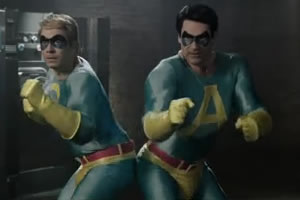
It reminded me that I wanted to be a performer.
#Tv funhouse ambiguously gay duo tv
I would take radio production and TV production and whatever-you’d alternate between different “jobs.” It was always the weeks where I was supposed to be the writer or the director or the performer when I would shine. It’s a complete waste of time, the last thing you should be doing at college. Yeah, that’s what I studied at college and look where it got me. I transferred to NYU to study communications. I failed so badly at what I was doing that my parents felt sorry for me. Science-related stuff in general gave me the most trouble, so I dreaded going through pre-dental and I sucked at it. I went to Cornell and the entire time I knew that I really didn’t want to be a dentist.

It’s strange because I was a complete pain in the ass in terms of making fun of my teachers and friends, but at the same time I took life very seriously and didn’t want to fuck up. Going into dentistry was a completely fear-based decision. I was very good at drawing popular cartoon characters, but it just seemed like a pipe dream. I would think about it because I was funny at school, but what I really wanted to do when I was a little kid was to be a cartoonist. But in my mind, I had no confidence that I could succeed in show business or writing. I didn’t particularly want to be a dentist. My father’s father was a dentist, and he didn’t really enjoy it. There were a million jokes about being a dentist they were like mothers-in-law. What happened?ĭentistry is a profession that’s often passed on, especially when I was a kid. I’ve read that you initially went to college to become a dentist, which is perhaps the most humorless profession in the world besides terrorism. I have a very vivid memory of being the only one in the class whose favorite show wasn’t They thought it was serious, including me. well, more so the comic strip than the cartoon-and I loved Hanna-Barbera stuff. If someone asked me about the story line for a particular episode I would’ve just said, “I don’t know, but she’s so brave and beautiful.” My favorite cartoon was My sister and I would literally kiss the TV at the end of theĬredits. I was a very weird kid in that I could not sit through anything on TV that took itself seriously. What I loved about them was their theme songs, and then I would turn the channel back to People assume that I loved superhero cartoons when I was a kid, but I actually didn’t. I’ll do something right down the middle if it’s too funny to ignore, but sometimes it’s almost joyless to go that way.ĭid you grow up watching a lot of cartoons and reading comic books?

Your scope is wider and there’s more art to it. I think you’re ultimately more effective anytime you can be less specific when you’re trying to make fun of things. Do you think your style of comedy taps into greater truths than a typical stand-up routine or sitcom? Vice: Most of your work relies on subverting childhood entertainment like cartoons and puppets and kid shows to poke fun at adult topics.

Above all else, I wanted to speak with Smigel because he’s figured out a way to distill honesty into comedy without compromising the laughs or coming off as preachy. I was fine with that because a) I was not looking to resuscitate a dead horse, and b) it’s pretty easy to guess what he thinks about the situation. He also said he did not wish to comment on the Jay Leno versus Conan shitshow altogether. Smigel agreed to this interview on the condition that I refrain from asking questions about the intellectual-property situation regarding Triumph and NBC because it could cause him a lot of unnecessary grief. , where he conceived Triumph and a whole bunch of other recurring sketches my dad thought I was stupid for staying up late to watch as a kid. Smigel was also the initial head writer for It ran for just one season, but you can easily see the influence it had on the perverse short-form stuff found on places like Adult Swim and Funny or Die.
#Tv funhouse ambiguously gay duo series
Series on Comedy Central that aired in late 2000 and was the first kids’ show blatantly made for grown-ups. That eventually became one of the only reasons to watch the show. (its titular characters voiced by Carell and Colbert), which afterĪmong an ongoing series of animated shorts called , which lasted for only eight episodes but was a template for the future of television comedy and served as an amniotic sac for people like Steve Carell, Louis CK, and Stephen Colbert. In 1996 he became the executive producer of Throughout the mid-80s to early 90s, he wrote some of the most memorable sketches to appear on the Second Coming of But besides Triumph the Insult Comic Dog, Smigel has been responsible for a large chunk of the best American comedic television of the past 25 years.


 0 kommentar(er)
0 kommentar(er)
